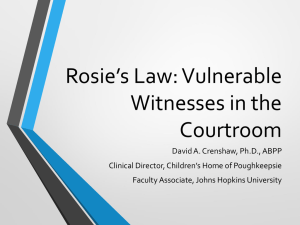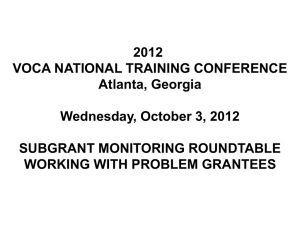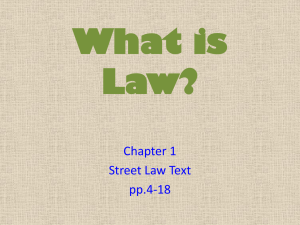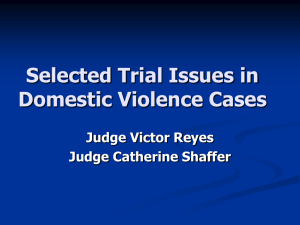THE HIDDEN COSTS OF ELDER FINANCIAL ABUSE
advertisement
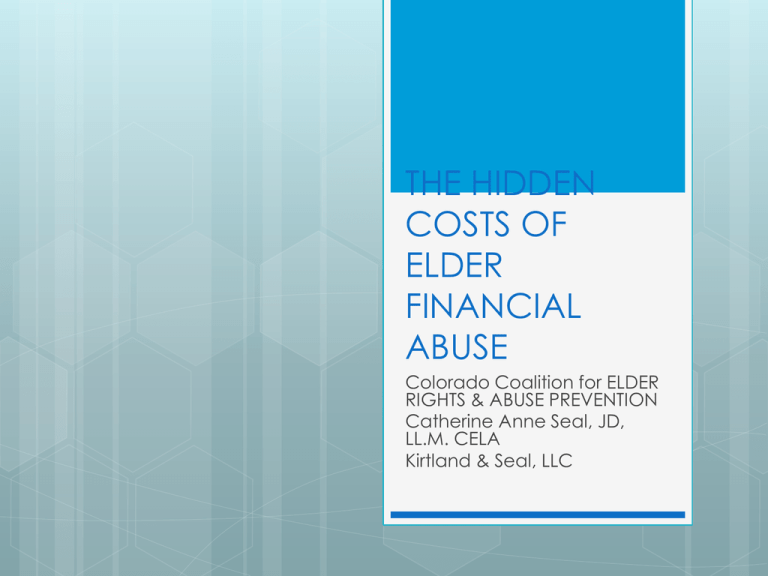
THE HIDDEN COSTS OF ELDER FINANCIAL ABUSE Colorado Coalition for ELDER RIGHTS & ABUSE PREVENTION Catherine Anne Seal, JD, LL.M. CELA Kirtland & Seal, LLC What is Elder Financial Abuse (EFA) A situation in which a person, including but not limited to, one who has care and custody of or who stands in a position of trust, of an elder adult, takes, secretes, or appropriates their money or property, to any wrongful use, or with an intent to defraud EFA The illegal or improper use of an elder adult’s financial resources Signs and Symptoms Unexplained disappearance of money or valuables Senior has an adult dependent child Senior is dependent upon abuser for care Senior has made transfers of money or property Senior has made excessive payments for care or services Signs & Symptoms continued Senior does not know how much income they receive Senior’s bank accounts are depleted Sudden appearance of previously uninvolved relatives or friends Change in payee, agent or in a will or trust Change in title to property and/or vehicles Change in bank or stockbroker Signs & Symptoms cont’d Change in banking habits, such as use of ATM’s or debit card for the first time Sudden increase in cash withdrawals Changes in credit card use Change in account beneficiaries Caregiver is overly frugal Unexplained cash flow Unusual household composition Signs & Symptoms cont’d Chronic failure to pay bills Senior is kept isolated Signatures on checks do not match senior’s signature Senior complains that he or she does not know what happened to their money Bank statements no longer come to the house Signs & Symptoms cont’d Senior reports signing documents and doesn’t know what was signed Change in lawyers, physicians, accountants Prevalence From 2011 study by Metlife Annual financial loss by victims of EFA is estimated to be at least $ 2.9 billion Women are nearly twice as likely to be victims of EFA than men Most victims are between the ages of 80 and 89, live alone and require some level of help with either health care or home maintenance Prevalence Nearly 60% of perpetrators are male, and most male perpetrators are between ages of 30 and 59 Most female perpetrators are between the ages of 30 and 49 Methods Crimes of opportunity – perpetrator realizes senor is vulnerable and exploits the vulnerability to gain control of money or property Methods Crimes of desperation – prevalent theory in the Great Recession, that dependent adult children are exploiting their parents or grandparents because they have no other resources Methods Crimes of Predation – a perpetrator targets a vulnerable senior Sweetheart scam New best friend Advisor scam Undue Influence Perplexing situations in which EFA occurs in instances in which the senior does not lack capacity Should But have the right to make gifts what if the “gift” causes financial hardship for the senior? Undue Influence (UI) Definition – the substitution of one person’s will for the true desires of another Can include persistent unrelenting pressure, threats, flattery, trickery and deception 4 elements to UI The victim must be susceptive due to dependency or because of a psychological, mental or physical disability There must be an opportunity, usually shown by establishing the existence of a confidential relationship 4 elements to UI There must be evidence that the influencer was inclined to exercise undue influence over the victim There must be evidence of an unnatural or suspicious transaction UI Undue influence is a form of psychological abuse UI How does UI occur? Isolation of the victim, controlling telephone calls, visits and mail Callers and visitors are told that the victim is asleep, busy or not feeling well enough to talk or visit UI The perpetrator convinces the victim that no one cares for the victim but the perpetrator A common tactic is to tell the victim that all other family/friends want to place the victim in a nursing home and the perpetrator is the only one who can prevent this from happening UI Making the victim dependent upon the perpetrator. This can include overmedicating the victim to affect their mental status, confining the victim and even providing insufficient nutrition to physically weaken the victim UI Threatening the victim with harm, neglect or abandonment if the victim does not comply with the perpetrator’s wishes UI Stockholm bonding Strong syndrome aka traumatic emotional ties that develop between two persons where one person intermittently harasses, beats, threatens, abuses or intimidates the other. Traumatic Bonding 1. There must be an imbalance of power with one party more in control 2. The abusive behavior is sporadic in nature as characterized by intermittent reinforcement, or alternating between acts of kindness or affection and abusive behaior Traumatic Bonding 3. The victim engages in denial of the abuse for emotional self-protection. In extreme cases, this can include disassociation. The victim feels powerless to change and uses denial as a coping strategy. 4. The victim masks that the abuse is happening Victims of UI Someone with assets to exploit, particularly someone with physical dependency, cognitive impairment, or suffering from depression or bereavement or with a chemical dependence Risk Factors of UI Elderly, mentally ill or physically disabled, or cognitively impaired Living alone Recently bereaved Dependent for transportation Few local family or friends Isolated from community Risk Factors for UI Naïve Little and overly trusting of strangers knowledge of finances Who are the perpetrators Family members, particularly dependent adult children Accountants, attorneys, trustees, guardians Housekeepers, caregivers, nursing personnel, physicians Church members, clergy Strangers Signs – victim behaviors Victim makes gift or loan to someone Victim is never left alone with anyone Victim is pressured to complete a transaction without being given time to consult an independent advisor Signs – victim behavior Victim appears coached when speaking with banker, attorney, financial advisor Victim appears sedated, intimidated or controlled Signs – perpetrator behavior Perpetrator speaks for victim and does not allow victim to speak Perpetrator does not appear to have any means of support other than victim’s resources Perpetrator has controlling and defensive attitude when questioned about relationship to victim Signs – perpetrator behavior Perpetrator denies access to victim by formerly trusted persons, including family, friends and advisors Perpetrator moves into victim’s home and promises to care for victim now in exchange for property at death Perpetrator convinces victim that no one else can be trusted Signs – perpetrator behavior Perpetrator creates alliance with medical professionals by insisting that only the perpetrator can care for the victim Perpetrator takes victim to new attorney to make changes to estate planning documents Bennet Blum, M.D. www.bennettblummd.com IDEAL MODEL Isolation Dependency Emotional manipulation and/or exploitation of a weakness Acquiesence Loss Hard to uncover Most evidence not readily available Threats and intimidation do not usually occur in the presence of witnesses The victim is often unwilling to admit that his or her actions were not voluntary The victim often believes that the perpetrator is the only one on whom they can rely and will not make statements against the pepetrator How to intervene in cases of EFA The method of intervention depends upon the intervener and the nature of the abuse Family intervention Family intervention can be difficult. The senior may be estranged from the family for reasons that have nothing to do with abuse. Common scenarios are a history of mental illness, alcoholism or abuse with the senior or a deceased spouse as the perpetrator Family Intervention The perpetrator may be intimidating family members to keep them away, either through threats of harm or by using their authority as agent. Perpetrators sometimes call the police to claim that family members are harassing the senior when the family tries to visit. The senior may be telling family to stay away, particularly in cases of undue influence Family Intervention The senior may be telling the family to stay away, particularly in cases of undue influence Family Intervention Family members may consult with an elder law attorney Family may call APS to make a welfare check on the senior Family may ask the agent to account for their actions as agent under power of attorney or trustee under a trust Family may petition for appointment of a conservator for the senior Family Involvement Contact law enforcement directly. While a welfare check is a likely result, if law enforcement is presented with a power of attorney which appears on its face to be properly executed, without more information it may be difficult for law enforcement to do more. The family may have enough evidence for a police investigation, such as evidence of improper financial transactions Family intervention Questionable methods include securing a new power of attorney and/or granny snatching Professional Intervention An attorney with a long standing history with a client may take an action, either with or without the client’s assent Some of these interventions can actually end up empowering a perpetrator Other interventions Someone in the senior’s life may notice a red flag A home care agency, assisted living facility or skilled nursing facility with an outstanding balance for service may contact APS with a concern about the unpaid bill Other Interventions A doctor’s office may notice that appointments have been missed A bank employee may notice that the individual is being accompanied to the bank by an individual not seen with the senior until recently. Other red flags for banks are sudden use of ATM’s or request for a debit card for the first time Other Interventions Someone in the home for some purpose notes that something appears “off” Repair person working on an appliance or utility, paramedic or firefighter responding to a call, or contractor or service provider Any of these parties could generate a report to APS Other interventions Nosy neighbors! APS Intervention Advantage of APS involvement is a review by a skilled social worker If the facts warrant an intervention, APS may refer the case to the county attorney for appointment of a conservator If the facts appear to suggest that a crime has been committed, APS may contact law enforcement APS involvement In some counties, including El Paso County, APS may refer the case to the Public Administrator for review, which is permitted under C.R.S. § 15-12-622 Public Administrator Some evidence of financial exploitation is obvious, such as a recorded deed Other evidence of exploitation must be recovered through research and investigation My investigation Review real property records for property currently owned Obtain an ownership and encumbrance report on all real property owned Search grantor/grantee index of county records for documents filed with senior’s name (property transfers, powers of attorney, mortgages) My Investigation If I have a known perpetrator, search CoCourts.com under the name and obtain basic information on criminal and civil cases the person has been a party to. $7.00 Shows criminal record and outstanding judgments My investigation Search the Accurint database for information on motor vehicles recently owned by the senior Review past tax records for information on past income generating assets My investigation Gather bank records for several years. If records begin when senior was handling their own finances, you can determine financial habits before abuse began. Bank records should include copies of checks Google payees on checks if you cannot determine purpose of the payment. My investigation Obtain past credit card statements Look for payments through check, electronic payment or credit card Some items usually do not make sense for a senior, particularly one homebound or nearly homebound Civil Remedies Someone has to pay for civil prosecution. Generally, there needs to be a reasonable chance of recovery, i.e. the ability to regain an asset or recover a judgment An agent under power of attorney can be required to account for their actions as agent Civil Remedies Appointment of Conservator Does not require finding of incapacity Does require finding of inability to manage money or property A conservator has the authority to obtain financial records necessary to pursue a perpetrator Civil Remedy Lis pendens Civil claims Breach of fiduciary duty against agent, guardian, personal representative, conservator or trustee Plaintiff alleges that fiduciary has failed to act according to the standard of care required by a fiduciary under applicable law Conversion Civil theft Plaintiff either owned the property or had the right of possession at the time of conversion Defendant converted the property by a wrongful act or disposition of the plaintiff’s property rights; and The plaintiff suffered damages Recission of Contract The senior may have entered into a contract which is not in their best interests. This can be a contract for sale of property which the senior was induced to sign, or for purchase of an annuity product or a service which is not an appropriate service for the senior Recission of contract Did the senior have capacity to contract? Restatement 2nd of contracts §12. Capacity to Contract (1) No one can be bound by contract who has not legal capacity to incur at least voidable contractual duties. Capacity to contract may be partial and its existence in respect of a particular transaction may depend upon the nature of the transaction or upon other circumstances. Recission of Contract 2) A natural person who manifests assent to a transaction has full legal capacity to incur contractual duties thereby unless he is (a) under guardianship, or (b) an infant, or (c) mentally ill or defective, or (d) intoxicated. Recission of Contract § 15 Mental Illness or Defect (1) A person incurs only voidable contractual duties by entering into a transaction if by reason of mental illness or defect (a) he is unable to understand in a reasonable manner the nature and consequences of the transaction, or (b) he is unable to act in a reasonable manner in relation to the transaction and the other party has reason to know of his condition Capacity Capacity can be a variable state for seniors. Capacity can be influenced by reactions to medication and by environmental factors. Because all persons are presumed to be of sound mind unless adjudicated otherwise, the plaintiff has the burden of proof regarding lack of capacity. Void vs. Voidable Contract One remedy the plaintiff may seek is the voiding of the contract. The majority rule distinguishes between void and voidable contracts. A contract entered into by a person who was previously adjudicated as incapacitated is void, while a contract entered into by a person alleged to be mentally ill or incompetent, but who was not adjudicated as incapacitated prior to execution of the disputed agreement is voidable, rather than absolutely void. Replevin Replevin is an action for recovery of the property, which can be brought against the person holding the property and is usually pled as an additional remedy in another action. In many states, after posting bond, a plaintiff can recover the property and maintain possession until trial. The remedy can be very useful in situations involving valuable personal property and the author has had experience with default by defendants at trial on the merits, as a result of filing such a pleading. Fraud In many cases, the questionable transaction involves fraud. In cases involving fraud in the inducement, the victim is told a lie or mistruth in order to convince him or her to enter into the contract. In cases of fraud in the execution, the victim is led to believe that the transaction is not what it is, i.e. the document is not a deed and will not transfer his property when the document is in fact a deed. Duress Duress is similar to fraud, but does not involve a claim of deceit. In a duress case, the plaintiff gave consent, but only because a threat of harm if he or she did not do so. Undue Influence Undue influence is a viable claim in instances where, although the victim did not act of his or her own free will, the nature of the persuasion was not a threat. Sometimes, the claim of undue influence is pled as part of a fraud claim, but undue influence is also pled as part of a recession claim as well. Undue Influence § 177 When Undue Influence Makes a Contract Voidable (1) Undue influence is unfair persuasion of a party who is under the domination of the person exercising the persuasion or who by virtue of the relation between them is justified in assuming that the person will not act in a manner inconsistent with his welfare. (2) If a party's manifestation of assent is inducted by undue influence by the other party, the contract is voidable by the victim. (3) If a party's manifestation of assent is induced by one who is not a party to the transaction, the contract is voidable by the victim unless the other party to the transaction in good faith and without reason to know of the undue influence either gives value or relies materially on the transaction. Undue Influence Undue influence can be a factor in a situation where the senior has deeded property to one of her children, in a case where she has several children. However, often the nature of the relationship between the grantee and grantor is such situations can make it very difficult to discern after the fact if the transaction was or was not the product of undue influence. If the child is the care-giver child, who is providing many services to the parent, it may not be unusual for the parent to provide more to that child than to the rest of her children. Undue influence is a frequent claim in a will contest, when an heir is unhappy with a testamentary plan. However, undue influence can be very difficult to prove. Constructive Trust A constructive trust is a remedy pled in equity, against an individual who by actual or constructive fraud, or by duress, or abuse of a confidential relations, or some other unconscionable conduct, has or holds title to property which he or she should not have. The remedy is designed to prevent unjust enrichment. Civil Theft Some state criminal theft statutes provide for civil actions, often including recovery of attorney's fees for cases involving the criminal elements of theft. Preparing the Civil Case In some states, an action involving a senior may receive expedited scheduling. Plaintiffs may wish to avail themselves of this, unless the particular case involves a number of financial records for which ample discovery time may be needed. Counsel may wish to take depositions of elderly clients and witnesses, in order to preserve testimony in the event a key witness is not available for trial. Criminal Prosecution Criminal codes in many jurisdictions have criminal statutes that are age specific. It may be that there is a specific charge for theft against a person who is a disabled adult or an adult over a certain age, or that the age or disability of victim causes the penalty for the theft to increase. Criminal Prosecution Criminal cases against abusers are less likely to receive attention from law enforcement for many reasons, including:. A belief that financial crime is less devastating than other types of crime A belief that misappropriation by a family member, particularly under power of attorney, is not theft, but rather is a civil matter. Victims may not be viable witnesses, making cases harder to prove. Criminal Prosecution Many financial abuse and exploitation cases are document intensive, requiring many hours of investigation. Few police officers and prosecutors have sufficient training to understand all of the issues present in a financial exploitation case (contract law, real estate law, and mental capacity) Statutes of limitations are not always long enough Effects of EFA Financial Effect Seniors are often at a stage in life where their expenses are rising. They may not be able to recover from significant financial exploitation. If the assets cannot be recovered, the loss of financial security can be devastating. Effects of EFA A second problem which can arise is the threat to Medicaid eligibility. If the senior needs skilled care within five years, the Medicaid lookback period can be a problem. This is particularly likely in cases where the perpetrator was an adult child of the senior, or other family member and the senior does not wish to cooperate with a criminal complaint. The transaction(s) will then be construed as a gift, which is a disqualifying transfer. Effects of EFA Psychological effect Effects are similar to other crime victims. A loss of trust in others is one of the most common consequences. Victims may become fearful. They may experience a loss of confidence, particularly adults with capacity who are the victims of undue influence. Effects of EFA Physical effect Common results are depression, hopelessness, even suicide. Prevention By the Senior Some of the tools used for prevention are the same tools used by perpetrators, including the power of attorney and the revocable trust. Both are useful alternatives for management of property that can be set in place by the senior in the event assistance is needed in the future. The keys for effective use are: Appropriate choice of agent or successor trustee Prevention By the Senior Standards for the agent or trustee, particularly with respect to gifting of the principal's assets Requiring regular accountings from the agent or trustee and designating someone trustworthy to review them on behalf of the principal Prevention Daily money management programs can provide seniors with supervision of routine financial matters, including bill paying, checking account management, budgeting, and verifying bills for payment (including medical bills). Fees for daily money managers can range from between $25 per hour to $100. The Association of Daily Money Managers can provide details and referrals. Prevention A senior can appoint a representative payee to receive his or her Social Security income if they need help in managing the funds. The Social Security Administration will appoint a payee upon receipt of an affidavit from a physician. Prevention The Social Security regulations provide a priority list for appointment as payee: (1) A legal guardian, spouse (or other relative) who has custody of the beneficiary or who demonstrates strong concern for the personal welfare of the beneficiary; (2) A friend who has custody of the beneficiary or demonstrates strong concern for the personal welfare of the beneficiary; (3) A public or nonprofit agency or institution having custody of the beneficiary; (4) A private institution operated for profit and licensed under State law, which has custody of the beneficiary; and (5) Persons other than above who are qualified to carry out the responsibilities of a payee and who are able and willing to serve as a payee for a beneficiary; e.g., members of community groups or organizations who volunteer to serve as payee for a beneficiary. Prevention Despite the priority list, the Social Security Administration will deviate from those criteria, as they also consider the following: (a) The relationship of the person to the beneficiary; (b) The amount of interest that the person shows in the beneficiary; (c) Any legal authority the person, agency, organization or institution has to act on behalf of the beneficiary; (d) Whether the potential payee has custody of the beneficiary; and (e) Whether the potential payee is in a position to know of and look after the needs of the beneficiary. The payee must use the funds only for the beneficiary and only for food, shelter, clothing, medical care and personal items. Prevention Attorneys drafting powers of attorney and revocable living trusts bear significant responsibility in counseling the client concerning the serious question of who they appoint as agent or trustee. Too often, attorneys give little emphasis to the importance of this question. Prevention By the Courts In guardianship and conservatorship, fiduciaries should be required to bond. For higher asset cases, the majority of assets can be held in restricted accounts, which require court orders for withdrawal, with a certain number of months of operating expenses held in accounts under bond. The combination can keep bonding costs down, while protecting assets. Orders for guardians and conservators should contain restrictions on sale and/or encumbrance of real property and courts should require recording of letters with restrictions noted in the real property records. Prevention By Third Parties Mandatory reporting of elder abuse, physical and financial, is the law in 46 states and the District of Columbia, but not in Colorado. In states with mandatory reporting, mandatory reporters are usually immune from liability for reporting suspected abuse. Reporting generally triggers a mandatory investigation by a state agency. Mandated reporters are generally doctors, nurses, psychologists and social workers. In some states, including California, financial institutions are among the mandated reporters. Prevention Employees of financial institutions are often among the first individuals to notice suspicious activity. Mandatory reporting statutes and training of bank employees can vent further exploitation of an individual after the matter comes to the attention of bank employees. Under Colorado law, an individual over age sixty may request that their bank provide them with an informed consent form waiving confidentiality to allow the bank to make the individual's banking records available to the county department of human services for the purpose of investigating a potential or known case of financial exploitation. Prevention BY STATE LEGISLATURES Some of the examples of financial abuse and exploitation discussed are gifts and loans to professionals who provide services to the senior. If professional organizations are unable to police their membership to prevent exploitation, state legislatures should enact legislation revoking professional licenses and criminalizing this conduct. State legislatures should also be prepared to provide adequate funding to adult protective service departments, to allow proper training and timely investigation In Conclusion CONCLUSION EFA has some common themes: Isolated seniors make better targets, particularly seniors who have been recently widowed Sometimes the exploitation is not discovered until the money is gone Even when confronted with a promissory note, an exploiter may deny that the debt exists or will claim it was paid or forgiven In conclusion The preventative measures listed above will not prevent all cases of financial exploitation. However, some of them can reduce the vulnerability of a senior. In Conclusion There is a misconception that the only individual harmed is the senior, but that is false. In many instances, when the senior lacks sufficient funds to pay for their care needs, he or she ends up living in a skilled nursing facility with Medicaid assistance. When the perpetrator is not pursued because a local prosecutor does not believe that they can prevail in a criminal action and there are not sufficient resources to pursue a civil case, the perpetrator is able to benefit from their actions and the cost is shifted to the state. The lesson the perpetrator learns is to exploit the elderly because it is profitable and there are no repercussions.

